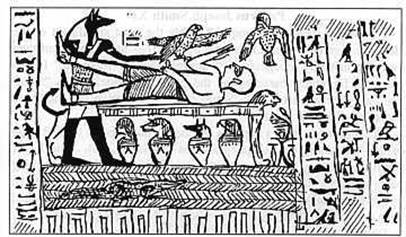 |
| Archaeological Proof of the Book of Abraham |
Like many Mormon teenagers outside of Utah, I spent my weekday mornings before high school at early morning seminary. Each year was devoted to studying a different book of scripture. The Book of Abraham were some of the coolest lessons, what with all the "astronomy" and "science" and all.
But the story of how the book came to be was also fascinating. Joseph Smith is inspired to buy a couple of mummies, he finds ancient papyri with strange Egyptian hieroglyphics. God helps him translate the writtings of Abraham into English, and now today we have a more complete knowledge of the gospel. From the Intro to the Pearl of Great Price:
The Book of Abraham. A translation from some Egyptian papyri that came into the hands of Joseph Smith in 1835, containing writings of the patriarch Abraham. The translation was published serially in the Times and Seasons beginning 1 March 1842, at Nauvoo, Illinois. (See History of the Church, 4:519–34.)
Unfortunately the papyri were sold off by one of Smiths' widows and the relics were destroyed in the "Great Chicago Fire" in the late 1800's...or so I had been told. Turns out there were fragments of the original papyri that were located elsewhere and did not burn. When they reappeared in the 1960's they could finally be evaluated by Egyptolygists. Professional critique of Egyptian translation wouldn't have been a concern for Smith in his day since Egyptian was thought to be a dead language. It wasn't until the 1850's that the Rosetta Stone was effectively used to translate Egyptian to English.
Others have done much more research on the findings of the professioal evaluation (both mormon and non-mormon) of the papyri, making it easier for the rest of us. The evidence against the Book of Abraham as a sacred text from God is compelling, but I'll highlight only what I find most interesting in this blog. MormonThink provides a thorough review from the skeptic's opinion. FAIR provides an apologist response to the some of these criticisms. If you want something in the middle, you can always review the wikipedia entry.
Some of the topics I find most pursuasive include:
- Age of the papyri- Despite being billed as having been "written by his own hand, upon papyrus", the papyri date only to around 100 BC, a good 1500 years after Abraham was believed to have lived. The apologist response is that this doesn't necessarily refer to this specific papyrus, but that Abraham's original could have been copied onto the newer scolls at some point.
- Papyri actually contain funerary text- The analyzed papyri does not reference Abraham at all, but contains text from the Egyptian "Book of Breathings." FAIR has a handful of theories of why the content of the Book of Abraham is not included in the recovered Papyri (all of which start by assuming the book is divine and accurate).
- Facsimile 1 Drawn Incorrectly- Apparently pieces of the scroll were missing when Smith performed his translation, so the missing pieces were added under Smith's direction. However, when compared to the funeral texts which contain the complete scene, it is clear Smith's attempt was not accurate. Apologists claim this is because at the time of publication it wasn't acceptable to leave parts missing, and filling in the blanks was not inspired.

Facsimile 1 as published in Book of Abraham (lds.org)
 |
| Actual Scene from Egyptian funeral texts (MormonThink.com) |
- Joseph Smith Interpretations of Facsimiles Incorrect- Remember those cool symbols in the facsimilies you would look through when you were bored at church? Turns out that Joseph Smith's interpretation in the footnotes was not generally accurate. Apologists have blamed the missing papyri, "We don't have all the material Joseph was working with, and until we do (which seems unlikely), we won't know why he interpreted the facsimiles as he did."
The inaccuracy of the translation of the Book of Abraham calls into question the doctrine established by the book, all subsequent actions of the church relying on its validity, as well as the prophetic ability of the author. If in fact the Book of Abraham is a scriptural account from god, then at very best it was not a translation but rather a revelation. Why Joseph Smith would not recognize the difference still calls into question his validity as anything more than a man with a creative imagination.
I recognize that for the believer, the validity of the Book of Abraham and Joseph Smith comes down to a spiritual testimony, or as stated by the Pearl of Great Price lesson manual:
The greatest evidence of the truthfulness of the book of Abraham is not found in an analysis of physical evidence nor historical background, but in prayerful consideration of its content and power.
I accept the arguement of faith in the absense of evidence, but do not accept faith as an alternative to strong, readily available evidence.


